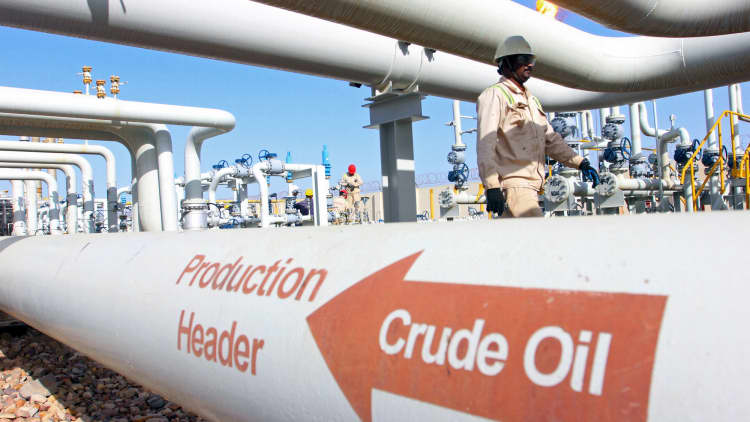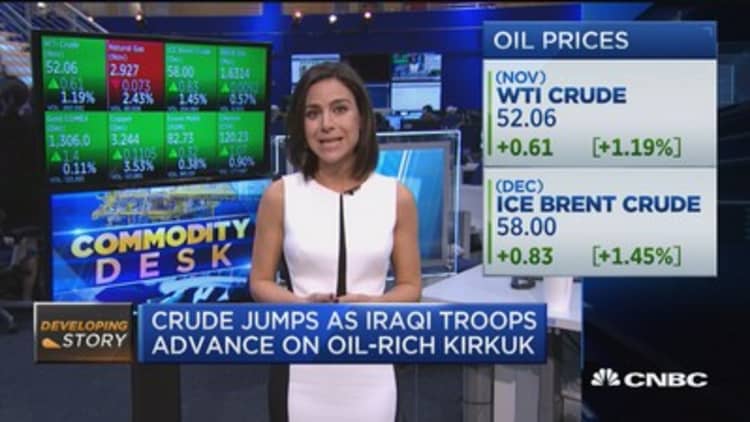
Oil markets jumped on Monday as Iraqi forces entered the city of Kirkuk, taking territory from Kurdish fighters and raising concerns over exports from OPEC's second-largest producer.
"We're seeing increased geopolitical tension in the Middle East providing support in the market today, namely in Iraqi Kurdistan, and some uncertainty around Iran," said Anthony Headrick, energy market analyst at CHS Hedging LLC in Inver Grove Heights, Minnesota.
Iraq's Kurdistan briefly shut down some 350,000 barrels per day (bpd) of production from major fields Bai Hassan and Avana due to security concerns. Iraq launched the operation on Sunday as the crisis between Baghdad and the Kurdish Regional Government (KRG) escalated. The KRG voted for independence in a Sept. 25 referendum.
U.S. West Texas Intermediate crude ended Monday's session 42 cents higher at $51.87 per barrel. Earlier in the day, it traded as high as $52.37.
International Brent crude futures rose 66 cents, or 1.2 percent, to $57.83 per barrel by 2:29 p.m. ET (1829 GMT), after trading as high as $58.47.

The government said its troops had taken control of Iraq's North Oil Co, and the fields quickly resumed production. The KRG government said oil continued to flow through the export pipeline, and it would take no steps to stop it.
Still, the action unsettled the market. Kirkuk accounts for 200,000 barrels per day (bpd) of the some 600,000 bpd of oil produced in the KRG region. Turkey has threatened to shut a KRG-operated pipeline that goes to the Turkish port of Ceyhan at Baghdad's request.
Renewed worries over U.S. sanctions against Iran also drew attention in the market.
U.S. President Donald Trump on Friday refusing to certify to Congress that Tehran is complying with the accord even though international inspectors say it is.
Under U.S. law, the president must certify every 90 days that Iran is complying with the deal, and that it remains in the country's national security interest. Congress now has 60 days to decide whether to reimpose economic sanctions on Tehran.
During the previous round of sanctions, roughly 1 million bpd of Iranian oil was cut off. Analysts said that while renewed sanctions were unlikely to curtail that level of exports again, they warned that such a move would be disruptive.

Cuts to U.S. drilling rigs, and an explosion overnight at an oil rig in Louisiana's Lake Pontchartrain, also boosted prices.
Drillers cut five oil rigs in the week to Oct. 13, bringing the total count to 743, the lowest since early June, Baker Hughes energy services firm said late on Friday.
Oil consumption has been strong, especially in China, where the central bank governor said the economy is expected to grow 7 percent in the second half, defying widespread expectations for a slowdown.
Sources said China was offering to buy up to 5 percent of Saudi Aramco directly, a move that could give Saudi Arabia more flexibility as it plans to float the world's biggest oil producer on the stock market.
— CNBC's Tom DiChristopher contributed to this report.

